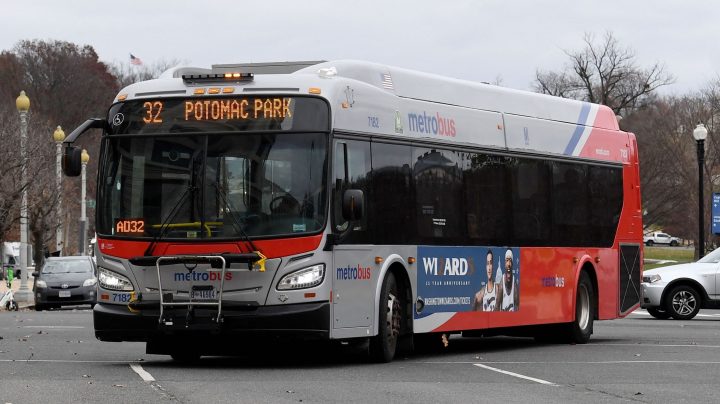
D.C. could become the largest U.S. city to experiment with free transit
D.C. could become the largest U.S. city to experiment with free transit

Washington D.C. could soon become the largest U.S. city where you can ride the bus for free. There are a couple of caveats, though: The free fare only applies to trips within city limits, and metro riders will still have to pay.
That measure would cost the city around $42 million annually. If it survives a second city council vote, D.C. will join cities like Albuquerque, Kansas City and Boston that have experimented with zero-fare transit during the pandemic.
Right now, a ride on the D.C. Metrobus costs $2. City Councilman Charles Allen wants to relieve riders of that expense.
“When it feels like the cost of everything is going up these days, being able to take that transit cost just off the table for working families, it’s hard to overstate how impactful that can be,” he said.
He hopes eliminating fares will also boost bus ridership, which is hovering around 80% of pre-pandemic levels.
“The more people that we can get on our transit, the more people out of you know driving individual cars on our roads that just keep adding to congestion, the better,” Allen said.
D.C. isn’t the only city rethinking the role of its transit system.
“What the pandemic has brought is a kind of existential question about whether public transit is an essential service,” said Sarah Kaufman with NYU’s Rudin Center for Transportation. Much like the public library or the fire department, essential services aren’t expected to bring in revenue to cover their costs.
In lots of cities, Kaufman said fares bring in just a small fraction of the transit budget to begin with.
But ditching fares is not always enough to entice riders.
“If you really want to get people to think of the bus as a good alternative compared to a taxi or their own vehicle, you need to provide a real, viable alternative,” she said.
Meaning, a bus that’s clean and safe and runs frequently and on time.
D.C.’s zero fare proposal would also invest $10 million in improving bus service, but many other pilot programs rely on free rides alone.
Yonah Freemark with the Urban Institute said boosting ridership shouldn’t be the only goal.
“You can ensure that people have access to the jobs and other needs that they have around their community,” he said, and reduce conflict over fares.
“Frankly, we have a history of arresting people who don’t pay fares,” he said.
Even if these programs aren’t getting more people to choose public transit, Freemark said, they’re promoting equity for people who have always relied on it.
There’s a lot happening in the world. Through it all, Marketplace is here for you.
You rely on Marketplace to break down the world’s events and tell you how it affects you in a fact-based, approachable way. We rely on your financial support to keep making that possible.
Your donation today powers the independent journalism that you rely on. For just $5/month, you can help sustain Marketplace so we can keep reporting on the things that matter to you.

















